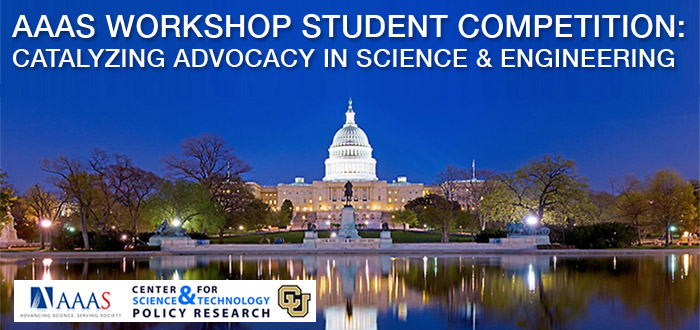
American Association for the Advancement of Science
"Catalyzing Advocacy in Science and Engineering" Workshop Student Competition
Reflections from the AAAS “CASE” Workshop
Katie Chambers
Civil, Environmental, and Architectural Engineering, University of Colorado Boulder
 My first trip to Washington, D.C. to participate in the 2019 AAAS Catalyzing Advocacy in Science and Engineering (CASE) was a whirlwind tour of science policy in the nation’s capital. From former members of Congress, to current Hill staffers, to federal science agency employees, each of the workshop’s sessions revealed a different role that science plays in policy. Among many topics, we learned about United States science and technology policy history, the federal budget process, Congress’s structure, and how scientists can better engage in policy. Each session left me wanting more and often with more questions than before the session began.
My first trip to Washington, D.C. to participate in the 2019 AAAS Catalyzing Advocacy in Science and Engineering (CASE) was a whirlwind tour of science policy in the nation’s capital. From former members of Congress, to current Hill staffers, to federal science agency employees, each of the workshop’s sessions revealed a different role that science plays in policy. Among many topics, we learned about United States science and technology policy history, the federal budget process, Congress’s structure, and how scientists can better engage in policy. Each session left me wanting more and often with more questions than before the session began.
One important topic that was pressed upon us during the workshop was the importance of understanding the mechanics of the federal government, specifically the federal budget process. Admittedly, before attending the workshop, the thought of two full sessions dedicated to the federal budget process sounded dry. However, science can’t happen without funding, and learning about the intricacies of such an important process for science was fascinating. For example, shortly before we arrived in D.C., the President released his budget and proposed massive cuts to science funding. The budget made its rounds through media outlets and caused quite a stir. However, through the workshop, we learned about how Congress controls the budget and how members of Congress from both political parties considered the President’s budget “dead-on-arrival” and a “non-starter” (for most President’s budgets too, not just our current President). We also learned about how politicians with diverse interests in both the House of Representatives and Senate come together to create the budget, which is an even messier process than it sounds like. A memorable quote from the first night of the workshop was “law and sausage are two things you do not want to see being made,” and it certainly proved to be true.
Perhaps my greatest takeaways from the workshop were the lessons on how to talk science to policymakers (and, more broadly, the public). It’s easy for scientists and engineers to rattle off facts and evidence to support our views; however, it’s often not the most effective way to communicate our work. Rush Holt, AAAS CEO and one of only two Ph.D. physicists during his tenure in Congress, gave the opening remarks and provided us with the advice, “people won’t care that you know if they don’t know that you care.” Another speaker, Sean Gallagher, AAAS Government Relations Officer, gave the advice to “meet people where they are” if we want to be successful advocates and policymakers. In a world that often feels so polarized, both remarks about understanding where people come from and what they value before trying to talk science were practical pieces of advice that I will certainly carry with me.
After the workshop, we able use our knowledge gained on the Hill and meet with Colorado’s members of Congress. Led by Heather Bené with CU’s Office of Government Relations, we had the incredible opportunity to meet with staffers from the offices of Michael Bennet, Cory Gardner, and Joe Neguse. In addition to meeting with Colorado’s members of Congress, I also had the opportunity to meet with staffers working for my hometown representative, Nancy Pelosi. It was a wonderful opportunity to share our diverse research and hear the perspectives of our different representatives.
Many thanks to the Center for Science and Technology Policy Research (CSTPR), the Center for STEM Learning, and the Graduate School for selecting me and sponsoring my participation in this workshop. I’m excited to use the insights I gained from the workshop moving forward in my studies and career!
